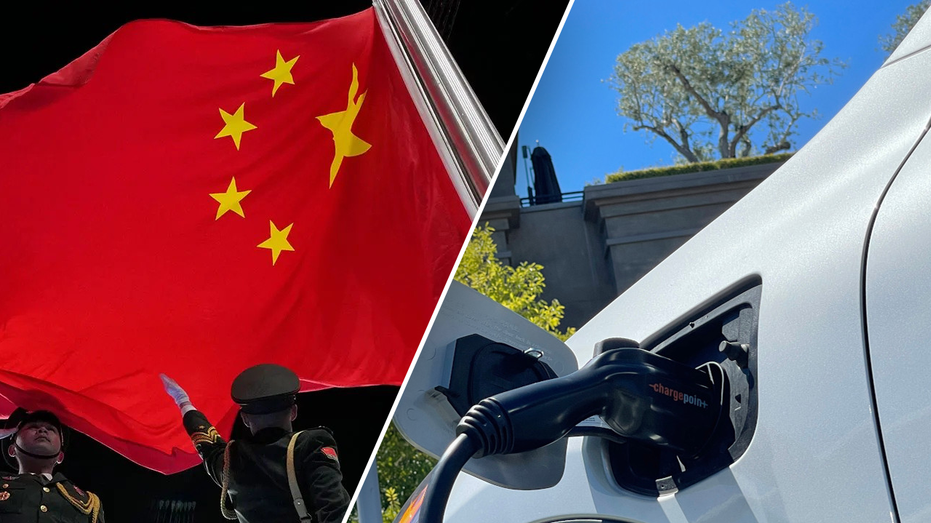Cheap Chinese EVs pose a 'security risk' to Americans: 'Keep them out,' economist warns
Automakers slowing EV production, waning consumer enthusiasm leaving room for Chinese models to dominate market
Consumers ‘don’t want to buy’ EVs: Diana Furchtgott-Roth
Heritage Foundation economist Diana Furchtgott-Roth discusses the electric vehicle markets as more automakers pull back on EV production.
Some U.S. automakers are pulling back on electric vehicle production despite the Biden administration's green energy push.
The void leaves room for cheaper Chinese electric vehicles to potentially enter U.S. markets, which could present a new kind of "security risk" for Americans.
Should a wave of CCP vehicles arrive, one economist emphasized the U.S. should "keep [the EVs] out."
"I think we should try and keep them out," Heritage Foundation economist Diana Furchtgott-Roth said.
BIDEN'S EV INSANITY JUST GOT EVEN WORSE
"If people are worried about a Chinese spy balloon going overhead, they would be worried about these Chinese EVs sending telematics back to China," she continued Thursday on "Varney & Co."
"Plus, car manufacturers now can disable cars from remote. What if we were in some foreign entanglement with China? And then China decided to stop all the EVs in the United States? It's a security risk."
China has already grown its electric vehicle market, with Chinese electric car company BYD surpassing Tesla as the top-selling EV company last quarter.

Heritage Foundation economist Diana Furchtgott-Roth warns about the "security risk" cheap Chinese electric vehicles would pose to Americans. (Getty Images/FOX Business / Fox News)
Tesla CEO Elon Musk said Chinese automakers were the "most competitive" and "will have significant success outside of China, depending on what kind of tariffs or trade barriers are established.
"If there are no trade barriers established, they will pretty much demolish most other car companies in the world," he told investors on a post-earnings call last month. "They're extremely good."
Stocks In This Article:
Furchtgott-Roth identified other issues related to the failing EV market, particularly in light of the recent challenges with electric cars and frigid temperatures.
"Consumers don't want to buy these EVs," she said. "And the recent debacle in Chicago where the chargers froze, the cars froze. There were blocks-long lines of Teslas waiting to charge that went down. It just proves it."
FORD HYBRID SALES JUMP IN JANUARY AS EVS SLIDE
EV owners in Chicago faced issues including decline in performance, weaker battery life, increased charge times and even long lines when wintry conditions gripped the Midwest last month.
Even prior to the winter weather performance issues, U.S. consumers' interest in electric vehicles had lost some charge over the past year.
Car insurance app company Jerry's 2024 State of the American Driver report released this week found that 41% of respondents said they were interested in buying or leasing an EV as their next vehicle, down from 49% from a year earlier.
Onsemi CEO: 'Hybrid is an EV stepping stone'
Major chip supplier to automotive industry details how hybrid represents a huge opportunity on 'The Claman Countdown.'
"Only about 7% of new vehicle sales are EVs, but the government wants to get it to 60% in 2030 and two thirds by 2032, with rules that are at the White House right now waiting to go out," the economist explained.
Furchtgott-Roth noted automakers are not likely to meet the target set by the administration given the cost concerns, lack of infrastructure and waning enthusiasm.
"If they don't, then the car companies are going to get fined, and they have to buy credit, and they'll pay for that by raising the price on the cars that we like to buy, like the Ford F-150 pickup truck and SUVs. But this is what the White House is still planning on doing."
While the U.S. is struggling to develop and ramp up the electric vehicle market, Furchtgott-Roth identified how China's advancements could pose a severe threat not only to the economy but also to national security.
GET FOX BUSINESS ON THE GO BY CLICKING HERE
FOX Business' Breck Dumas and Chris Pandolfo contributed to this report.






















